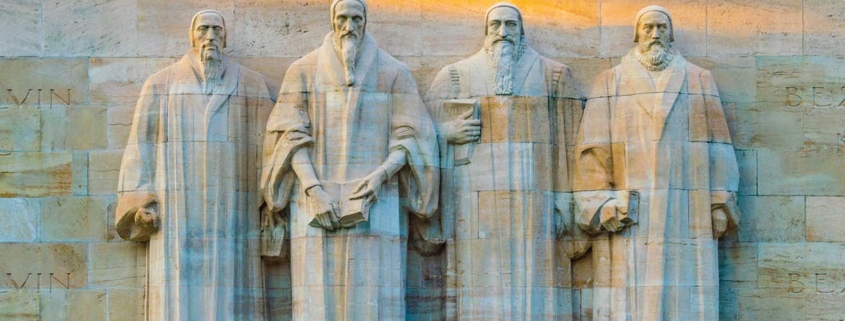Anti-Jewish Sentiment in Protestant Christianity (Pt. 2 of 4)
In the previous article in this series, we briefly discussed the anti-Jewish history of Ancient Christianity and Catholicism, and then looked at the abhorrent anti-Semitism of Martin Luther, the first Protestant Reformer. Had Luther been the only anti-Jewish Protestant, little concern would be warranted; however, Luther was merely the first of many.
John Calvin (1509–1564)—an extremely influential Protestant Reformer who was a contemporary of Luther—made noteworthy anti-Semitic remarks, claiming, “God so blinded the whole [Jewish] people that they were like [stubborn] dogs…. I have never seen [in them] either a drop of piety or a grain of truth…—nay, I have never found common sense in any Jew.”1 This clear anti-Semitism should give readers pause when analyzing Calvin’s teachings about Israel, especially considering they are filled with replacement theology. Concerning God’s promise in Romans 11:26 to save “all Israel,” Calvin stated that Paul is not referring to the Jewish people here, but instead naming “the church… the Israel of God” rather than “the carnal children of Abraham.”2 Ironically, Calvin interpreted the verse immediately prior—which speaks of Israel’s “blindness in part”—as indeed referring to Jews, such that “the gospel may be transferred to the gentiles.”3 Calvin’s teaching reveals how replacement theology usurps Jews’ identity and steals God’s promises and blessings from them.
Throughout the seventeenth century, the anti-Jewish ideas of the Reformation continued, though less blatantly. This was a period of increased tolerance for Jews, since many Protestants dismissed Calvin’s interpretation of Romans 11:26 and believed that the salvation of the Jewish people was necessary before the Second Coming.4 Yet despite this philo-Semitic belief, many Protestants saw Jews as personifications of God’s rejection,5 and encouraged Jews to assimilate into Gentile Christianity rather than to retain their Jewish identities.6 Protestants of this time did not reject Jews simply for being Jews; they did, however, reject Jewishness simply for being Jewish. As John Milton (1608–1674) put it, “[T]hat which was to the Jew but Jewish, is to the Christian no better than Canaanit[e customs].”7
The eighteenth century, with the Methodist movement and Great Awakening, brought a spiritual revival to British and American Protestantism—but sadly also a revival of anti-Jewish theology. One of the foremost preachers of the period was Jonathan Edwards (1703–1758), who claimed that at the destruction of Judah in AD 70, God ended the entire “Jewish church…, and all the Jewish world. And from this time began the Gentile church to be the only people of God”8 (emphasis added). Furthermore, allegorizing the Book of Esther, Edwards claimed that God not only divorced Israel, but took the Church as a new wife “better than she,” just as King Ahasuerus divorced Vashti and remarried to Esther.9 Edwards used the already established ideas of replacement theology to paint an undeniably anti-Jewish picture, leaving the Jews as no more than a desolated nation and forsaken bride. In addition to Edwards, John Wesley (1703–1791) also held traditional anti-Jewish beliefs, claiming (like Pope Innocent III) that Jews are a cursed and rejected people. While he did express some of the positive sentiments of the seventeenth century by asking God to save all Israel, Wesley called Jews “Outcasts of [God]…, Branded like Cain…, Abhorr’d of men, and cursed of God.”10
Did this post bless you?
♥
Nineteenth century teachings continued to reflect previous anti-Jewish sentiments. Charles Finney (1792–1875), a leader in the Second Great Awakening, followed Calvin’s pattern of replacement theology, saying that the Church has replaced the Jews as the recipients of any of God’s promises. He taught, “The promises made to Israel and Judah, in the Old Testament, are promises made to the whole Christian Church.… Thus the Church of Christ is called the ‘Israel of God’… to whom, collectively and individually, all the promises of the Bible belong.”11 Finney conflated Israel and the Church, calling the Israelites “the Church under the Old Testament Dispensation,” with all of God’s promises to Israel actually being directed toward “the Church under the Christian Dispensation.”12 Later in the century, Charles Spurgeon (1834–1892) did speak of Jews in positive terms, calling them “the older branch of the family,” and saying that “[a] Christian is the last person who ought ever to speak disrespectfully or unkindly of the Jews,” because Yeshua and the Emissaries were Jewish.13 Yet despite this philo-Semitism, replacement theology still crept into his teachings, as seen when he spoke of “the true Israel, namely, the elect of God.”14 He elaborated by using Luther’s same example of Ishmael and Esau to make the point that ancestry has no bearing on chosenness.15
Beginning at the Reformation, anti-Jewish sentiment was woven into Protestant thought, becoming ingrained in the teachings of the following generations. In the next part of this series, we will see how these insidious beliefs would have unimaginable consequences in the twentieth century—one of the darkest chapters in all of Jewish history.
What do you think? Share your thoughts in the comments below!
- Calvin, John. Commentaries on the book of the Prophet Daniel. Translator Thomas Myers. 1st ed. Vol. 1. Edinburgh, 1852–1853: 185
Archive.org, Commentaries on the book of the Prophet Daniel (Accessed 13 Jul. 2023). ↩︎ - Calvin, John. Commentary on the Epistle to the Romans. Translator Francis Sibson. London, 1834: 475
Archive.org, Commentaries on the Epistle to the Romans (Accessed 13 Jul. 2023) ↩︎ - Ibid., 474–475 ↩︎
- Healey, Robert M. “The Jew in Seventeenth-Century Protestant Thought.” Church History, vol. 46, no. 1, 1977: 75.
JSTOR, “The Jew in Seventeenth-Century Protestant Thought” (Accessed 13 Jul. 2023) ↩︎ - Ibid., 74 ↩︎
- Ibid., 78–79 ↩︎
- Milton, John. “The reason of Church government urged against prelacy of true religion, heresy, schism, toleration.” The Prose Works of John Milton. Vol. 2. United Kingdom, G. Bell & sons, 1848: 497.
Google Books, The Prose Works of John Milton (Accessed 13 Jul. 2023) ↩︎ - Edwards, Jonathan. Notes on Scripture. Editor Stephen Stein. Works of Jonathan Edwards. Vol. 15. Yale Univ. Press, 1998: 49–50.
Jonathan Edwards Center at Yale University (Accessed 13 Jul. 2023) ↩︎ - Ibid., 60–61 ↩︎
- Wesley, John. “Hymns of Intercession for All Mankind.” The Poetical Works of John and Charles Wesley. Vol VI. London, 1870: 136.
Google Books, The Poetical Works of John and Charles Wesley, “For the Jews” (Accessed 13 Jul. 2023) ↩︎ - Finney, Charles. “The Promises.—No. 1.” The Oberlin Evangelist. Vol. 1, no. 12 (1839): 89.
Google Books, The Oberlin Evangelist (Accessed 13 Jul. 2023) ↩︎ - Ibid. ↩︎
- Spurgeon, Charles Haddon. The Metropolitan Tabernacle Pulpit: Sermons Preached and Revised. 63 vols. United Kingdom, Passmore & Alabaster, 1873, vol. 47: 61 ↩︎
- Ibid., vol. 33, 171 ↩︎
- Ibid. ↩︎










I grew up in a Lutheran congregation in SE PA. I never hear antisemitic rhetoric in that church. I worked in a Kosher environment with Rabbi’s out of NYC. They were not very accommodating to engage in speaking about the faith, never pushing Messiah (Missing their call given to Abraham Gen. 12:1-3). Now as an adult I have heard of the Replacement Theology from a number of sectors of the faith in my reading & was always troubled by this ideology that did not sit well with my spirit!
I have visited Israel twice in my life & received much in strengthening my love for the Jewish people & the Arab Christians trapped by the terrorist leadership around them. One Arab woman in Bethlehem grabbed me, kissed me & thanked me for coming, as it had uplifted her spirits & encouraged her faith in Christ.
Personally, I attended Christ for the Nations & Now Pastor in the Foursquare Gospel movement. Happily, we/I have stood with Israel from the time of my 2nd birth (Though my BC days I had no real clue about this issue). I did not side with the those who say, we the church have replaced Israel or the Jewish people. I have always taught that the Jewish people are the eldest child of God through Abraham & that we Gentiles are the younger child. That the Jew has a double blessing as the chosen/eldest & we are grafted into an amazing family!
My heartache now is how many have given money to quote “Christian Arab Charities” that are really fronts for terrorism!!! I had one gal in our fellowship send me a list of several…ALL were proven fronts of terroristic activity against Israel & the Jewish people today (Several for decades). She has a hard time with Israel’s response to the genocide of Jews in October. This woman, like too many in churches have listened to the liberal media propaganda blasting Israel for all the Arab deaths…most of which are the terrorists propaganda of their own innocent people they have killed or used as human shields because they would not support their demonic ways.
Thank you for enlightening me even more on some of the Reformational leader’s rhetoric beyond Luther!
Blessings
I consider myself a ‘Ruth’ Gentile. I know I’m bought with the blood of Messiah Yeshua but can’t imagine living a lifestyle that didn’t honor the Jewish people. Honor your Father and Mother. God is my Father, Israel is my Mother, not the church fathers. The Anti- Judaica theology of the church is like smoke in the air. It’s the atmosphere. The church to me is a characature of the faith. If you ask me the book of Acts shows the Orthodox Jewishness of the faith and particularly the Orthodox Jewishness of the Apostle Paul. I am thoroughly disgruntled with church. Shalom